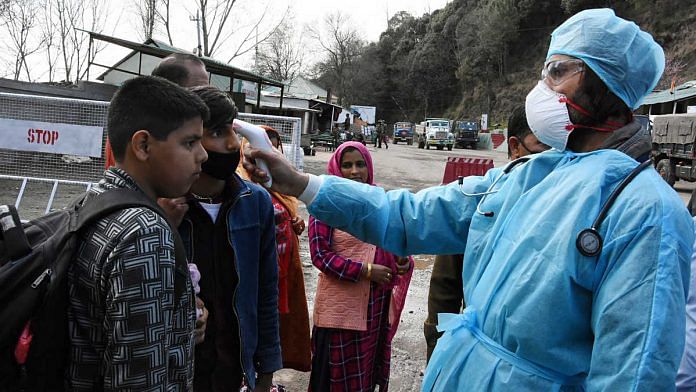New Delhi: With more than 42,000 deaths across the world due to the novel coronavirus, scientists are racing to understand the virus better and develop effective treatment plans.
ThePrint brings you the top 5 global research developments on Covid-19.
Low-cost antibody test developed by UK firm
A health technology firm in UK has developed low-cost Covid-19 antibody tests that can identify people who have been exposed to the virus.
Antibody tests identify people who have previously been infected by the virus and have developed antibodies against it. The reverse transcriptase–polymerase chain reaction (RT-PCR) tests, on the other hand, are used to test whether a person actually has the Covid-19 disease caused by the virus.
Antibody tests help determine the true extent of the infection spread by identifying those who may have recovered after developing mild symptoms or never developed symptoms despite being exposed to the virus.
The firm Mologic, which created one of the first at-home pregnancy tests, has sent these 10 minute tests for lab validation. If trials are successful, the tests may become available by June.
Also read: Govt asks researchers to develop mathematical models on Covid-19 spread, will fund studies
Covid-19 patients may develop eye-related complications
A study from China suggests that patients with Covid-19 can develop eye-related complications, especially in severe cases.
Researchers from China studied 38 coronavirus patients in Hubei who had eye-related manifestations, such as epiphora, conjunctival congestion, or chemosis (swelling of the conjunctiva). They found that these commonly occurred in patients with more severe coronavirus infections.
The team found that RT-PCR results were positive for SARS-CoV-2 in 28 nasal and throat swabs and two conjunctival swabs.
New model can predict Covid-19 patients a week ahead
Researchers in Italy have developed a mathematical model that can accurately predict the number of people who are likely to contract novel coronavirus in a country up to a week in advance.
Such models can help governments make preparations to manage patients in advance.
The study, published in the journal PLOS One, shows that Covid-19’s R-naught value, which reflects the average number of people who may catch an infection from one contagious person, is around 2.5.
The researchers also estimated a mortality rate of approximately 0.15 per cent of a country’s total population for the virus.
Also read: Tracking India’s coronavirus deaths — 24 of first 35 victims had no foreign travel history
Study indicates possible faecal transmission of Covid-19 among children
A study published in the journal Nature Medicine reveals that rectal swabs from children may test positive for SARS-CoV-2, even after the nasal and throat swabs test negative for the virus.
The study, which looked at 10 children with Covid-19, suggests that there may be a possibility of faecal transmission for the novel coronavirus among children.
In the study, children with the disease showed very mild symptoms while one patient did not show any symptoms. None of them required respiratory support or intensive care. Chest X-rays lacked signs of pneumonia, a defining feature of the infection in adult cases.
However, eight children persistently tested positive on rectal swabs even after nasopharyngeal testing was negative, raising the possibility of faecal–oral transmission.




This is a really good segment. JHU has a mailing list. This segment would make for a perfect mailing list too. Top 3-4 global + Top 3-4 Indian developments related only to the health and epidemiological considerations of covid19.
With maybe 1-2 stories/links on who people can collaborate / donate / sources of local information related to the outbreak <- avenues for action-oriented individuals.